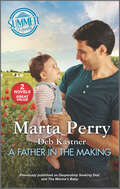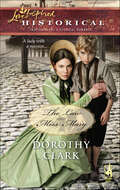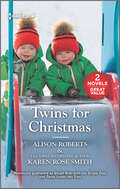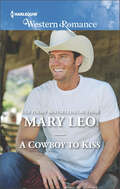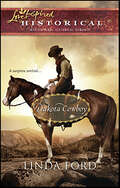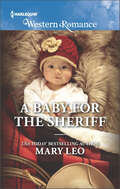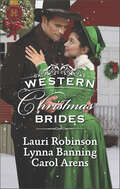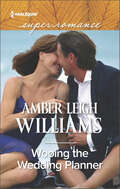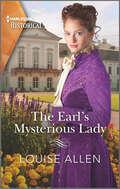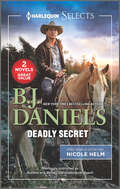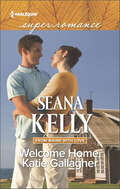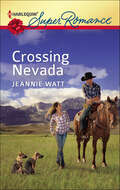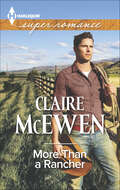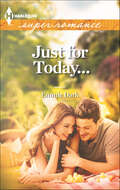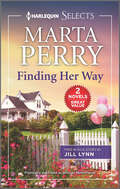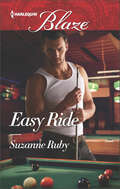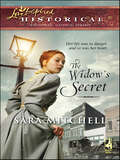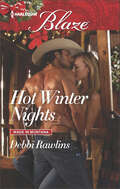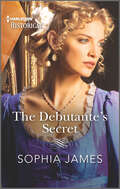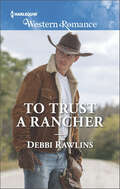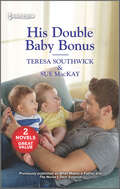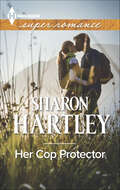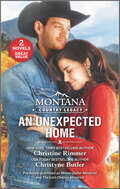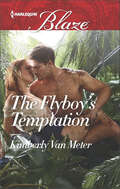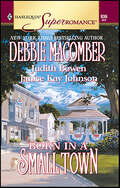- Table View
- List View
A Father in the Making
by Marta Perry Deb KastnerFeel inspired this summer with stories of love and familyDesperately Seeking Dad by Marta Perry Anne Morden was a breath away from adopting Emilie, the child she had always longed for. All that was left to do was to convince police chief Mitch Donovan to sign away the rights to his daughter. But with his denial of paternity, Mitch put Anne's lifelong dream on hold. Yet Mitch seemed determined to make things right, if only Anne could trust him enough to let him help. The Marine's Baby by Deb Kastner The US Marine Corps made a man out of Nathan Morningway. But the orphaned baby girl left to him by his military buddy made him a father. With no training in parenthood, Nathan heads home—where he's not exactly warmly welcomed by his family. But day-care worker Jessica Sabin helps him learn how to be a dad. That seems to make Jessica happy, so why does she look so sad sometimes?
The Law and Miss Mary
by Dorothy ClarkIt's disgraceful how St. Louis's orphans are treated. And Mary Randolph plans to do something about it. She's lost her faith, but she still has compassion and a drive to help innocents in need. If she has to battle with by-the-book police captain Samuel Benton to protect them…well, she'll give him a challenge he'll never forget.A poverty-stricken childhood left Sam hungry for the social acceptance now within his reach. All he has to do is follow through with the city fathers' plans. But Miss Randolph's feisty perseverance gives him second thoughts, reigniting his faith—and showing him how true love can fulfill all their dreams….
Twins for Christmas
by Alison Roberts Karen Rose SmithAll they need for ChristmasSleigh Ride with the Single Dad by Alison Roberts Dr. Grace Forbes&’s first day in Manhattan Mercy&’s ER is unforgettable—especially when she runs into her old flame, ER chief Charles Davenport! The spark is still there between them, but they&’ve both changed. Charles is now a widower and single dad to twin boys, while Grace has lost her dream of having children. Yet, as the weather gets colder, Charles and his little family might make her Christmas wish come true.Twins Under His Tree by Karen Rose Smith Young widow Dr. Lily Wescott has just given birth to twin baby girls. And she couldn&’t have done it without Mitch Cortega. The decorated combat surgeon was with her every step of the way. Both Mitch and Lily need time to heal past wounds, but how much longer can they fight their attraction? With Christmas just around the corner, maybe it&’s time to trust that love can bring them a new future!USA TODAY Bestselling Author Karen Rose Smith Previously published as Sleigh Ride with the Single Dad and Twins Under His Tree
A Cowboy to Kiss
by Mary LeoTHIS COWBOY WON'T QUIT Jake Scott welcomed the invitation from Kenzie Grant's father to visit their ranch in Idaho. It was a chance to help out an old family friend, and to see Kenzie again. But judging by her frosty reception, his old friend wasn't informed-and isn't amused. The stunning little spitfire that dogged him around when they were kids has grown into a fabulous force to be reckoned with. And he's in her crosshairs. It's tough to tell which she resents most-his advice on eco-friendly ranching methods or just his presence. Either way, he's got her riled. Just not in the way he'd hoped. How can he convince her that working together could be the best thing for the ranch...and for them?
Dakota Cowboy
by Linda FordSurely the handsome cowboy can't be serious. Lucy Hall's father wants to see her? Now? After years of being brushed aside, Lucy's in no hurry to rush to the man's deathbed. And just as Wade Miller rode into town to bring her father's message, he can ride right back out with hers. But before Wade can leave, Lucy finds herself witness to a terrible crime, with a killer on her trail. In this storm of trouble, she'll take any shelter she can find—even if it means going to her father after all. Yet safety comes at a high price when time with the Dakota cowboy puts at risk the one thing Lucy's always protected—her heart.
A Baby for the Sheriff
by Mary LeoAND BABY MAKES THREE?Veterinarian Coco Grant is used to animals being left on her doorstep. The last thing she expects to find there is an abandoned baby girl. As a temporary mommy, Coco can’t resist loving her sweet little charge. But there’s also Coco’s growing attraction to the town’s handsome, if infuriatingly by-the-book, sheriff.To help with the baby, Sheriff Jet Wilson is practically living with Coco—and the town gossips are in seventh heaven! It’s only when rumors start circulating about Lily’s real father that Jet realizes that there’s a lot more at stake than setting a few tongues wagging. Because not only is the lawman falling for the baby…he’s falling for Coco even harder.
Western Christmas Brides: A Bride and Baby for Christmas\Miss Christina's Christmas Wish\A Kiss from the Cowboy
by Lynna Banning Lauri Robinson Carol ArensThree heartwarming stories of Christmas in the Wild West.A Bride and Baby for Christmas by Lauri RobinsonPregnant Hannah Olsen has made a list of Oak Grove’s eligible men. A list that Teddy White sees—and he’s not on it! Time for him to act so that both their Christmas wishes can come true.Miss Christina’s Christmas Wish by Lynna BanningDedicated new teacher Christina Marnell feels her heart race as she watches Ivan Panovsky chop wood for the school. She had ruled marriage out, but Christmas is a time when miracles can happen…A Kiss from the Cowboy by Carol ArensKitson James and Livy York both have secrets, but can their love overcome the lies they’ve told? A Christmas kiss might help…
Wooing the Wedding Planner
by Amber Leigh WilliamsNo more wedding marches for her! Wedding planner Roxie Honeycutt can make happy-ever-after come true for anyone except herself. Freshly divorced and done with love, she's okay with watching clients walk down the aisle. What's not okay? Sharing a charming Victorian house with accountant Byron Strong. He's frustratingly sexy and determined to keep her confused. Roxie thought Byron's expertise was numbers, yet somehow he sees her for who she really is. Somehow he understands the hurt she hides behind a trademark smile. Suddenly romance is tempting again, even if it means risking another heartbreak.
The Earl's Mysterious Lady
by Louise AllenA dramatic Regency romp from this bestselling author!An unexpected reunion…With the earl she left at the altar… Viola fled her arranged marriage to Guy Thurlow, Earl of Easton, right at the altar steps. Now she is Cressida Williams and greatly changed—so much so that when Guy finds her trespassing on his neglected estate, he doesn&’t recognize his runaway bride. As they work together to restore his grounds, desire flares. But she must deny his temptation because it would be socially ruinous if he discovered who she really is…From Harlequin Historical: Your romantic escape to the past.
Deadly Secret: A 2-in-1 Collection
by B.J. DanielsDanger at close rangeRustled byNew York Times bestselling author B.J. DanielsUndercover investigator Brittany Bo “Jinx” Clarke is determined to bring down a cattle rustling ring. Dawson Chisholm wants to retrieve his stolen cattle. To get what they both want, they’ll have to work together. But spending their days and nights alone—just the two of them against a band of thieves—presents another problem for Jinx: resisting the irresistible Chisholm charm. And she’s not sure she wants to…FREE BONUS STORY INCLUDED IN THIS VOLUME!Stone Cold Undercover Agent by Nicole HelmJaime Alessandro fears he’s been undercover too long. Now his only shot at destroying one of Texas’s largest crime organizations is Gabriella Torres—a “gift” from The Stallion and his longest-held captive. Her inside info and inspired moves are helping Jaime take the gang apart. But what he’s starting to feel for the brilliant, tough-minded Gabriella could get them worse than dead…
Welcome Home, Katie Gallagher (From Maine with Love)
by Seana KellyNobody said a fresh start would be easy A clean slate is exactly what Katie Gallagher needs, and Bar Harbor, Maine, is the best place to get it. Except the cottage her grandmother left her is overrun with woodland creatures, and the police chief, Aiden Cavanaugh, seems determined to arrest her! Katie had no idea she'd broken his heart fifteen years ago... "Kelly's debut book is smart, sexy, and so much fun. I couldn't put it down." -Laurie Benson, author of the Secret Lives of the Ton series
Crossing Nevada
by Jeannie WattAfter the attack that ended her modeling career, Tess O'Neil wants only to feel safe. She thinks she's found a sanctuary on a Nevada ranch, where she can live in solitude. Too bad rancher Zach Nolan isn't getting the message. The single dad wants to lease her land, and he won't quit until she says yes. That means he's always around!Letting the cowboy with the see-right-through-her baby blues into her life is too dangerous. Almost as dangerous as the wild hope and yearning Zach and his three daughters are awakening in Tess. She's already risked so much. Maybe it's time to take the biggest gamble of all on the one thing she never dreamed she'd find-a home.
More Than a Rancher
by Claire McEwenDoes he dare to follow her lead? Ballroom dancer Jenna Stevens is done with all things romance. It's so much more satisfying to focus on her career. That is, until she meets Sandro Salazar-a handsome, brooding small-town chef and sometimes rancher. Jenna is drawn to him immediately, but there's no way Sandro could fit into her fast-paced, urban life. Still, as she gets to know this reformed bad boy, she begins to wonder if maybe their two worlds can merge. One thing's for certain-Jenna will have to take the lead if she has any hope of Sandro seeing what's possible for the two of them...together.
Just for Today . . .
by Emmie DarkShe's not that kind of girl!Veterinarian Jess Alexander doesn't have one-night stands with the best man at a coworker's wedding. But thirtysomething divorcée Jess is definitely in a rut that a night of reckless passion with a younger man just might break. And what better candidate than criminally good-looking Sean Paterson?Being with Sean is exhilarating. But where could this relationship possibly go? Expecting anything more than a good time from Sean is a one-way ticket to heartbreak. Against her better judgment, Jess can't walk away from whatever this is...not yet.
Finding Her Way
by Marta PerryTrusting in second chancesFinding Her Way by Marta Perry When Caitlyn Villard becomes mother to her orphaned twin five-year-old nieces, she trades New York City for Prairie Springs, Texas, the small military town she&’d run from at first chance. Learning how to be a slow-paced soccer mom is not easy. Until handsome army chaplain Steve Windham steps in to show Caitlyn that sometimes you find the man—and life—of your dreams where you least expected. FREE BONUS STORY INCLUDED IN THIS VOLUME!The Bull Rider's Secret by Jill Lynn Letting bull rider Jace Hawke back into her life breaks all of Mackenzie Wilder&’s rules—just like he broke her heart years ago. Jace is working at her family&’s ranch while recovering from a rodeo injury…and chipping away at Mackenzie&’s tough-girl exterior with each passing day. Which is the bigger mistake: falling for Jace again…or letting him go without a fight? Previously published as Mission: Motherhood
Easy Ride
by Suzanne RubyEvery cowboy has his secrets... Reporter Kirby Montgomery is undercover at a secret club-where deliciously sexy men are rumored to sell their company and their bodies. The most popular of all the hunks? Easy Ride. Handsome as hell with a ripped bod to match, he's 100 percent red-hot cowboy. And all it takes is one scorchin' kiss to break every one of Kirby's rules... But Kirby isn't the only one breaking rules. Adam "Easy Ride" Drake isn't what he seems. And the explosive chemistry between them is only the beginning of an attraction that spells trouble. With the line between fantasy and reality getting blurry, Kirby has to decide what's more important: the story that could make her career or the man she wants by her side.
The Widow's Secret
by Sara MitchellWhen Jocelyn Tremayne saved her husband's reputation, she lost everything-including her faith in God. The idealistic bride once had a future all New York society envied. Now the young widow is suspected of an unthinkable crime. And to clear her name, she must uncover a conspiracy...and endanger her disillusioned heart.Although Secret Service agent Micah MacKenzie needs Jocelyn's aid to infiltrate the city's most privileged circles, he's determined to keep her at arm's length. But the more she risks to help him find the truth, the more he sees the wrongly judged woman she truly is. Now he will do whatever it takes to win her trust, rekindle her belief-and prove his love.
Hot Winter Nights (Made in Montana)
by Debbi RawlinsThis cowboy can make any girl melt! Montana in December is cold. Still, struggling actress Lila Loveridge is committed to the independent movie they're shooting-despite frigid temperatures, an empty wallet and a sneaking suspicion that her acting career has frozen in its tracks. Good thing there's a Montana cowboy hot enough to keep her warm. Rancher Clint Landers is one tall, lean and sizzling specimen, and before long, Lila is shivering with pleasure. Their chemistry is impossible to resist. But while every night is deliciously wicked, every day is a reminder that they can't have a future together. Because in order for Lila to follow her dream, she'll have to leave her sexy cowboy behind...
The Debutante's Secret
by Sophia JamesScandal and secrets abound in this sexy Regency romance!Seeking a sensible husbandTempted by a dissolute rogue… Debutante of the season Esther Barrington-Hall is looking for a steadfast, responsible husband after her dreadful childhood with her destitute mother. Aristocrat Oliver Moreland is a notorious rake and Esther knows it would be wrong to give up her newfound life of safety for a man like him. But he is exciting and undeniably attractive. And dangerous, too. Because he is the one man in society who knows about her past…From Harlequin Historical: Your romantic escape to the past.
To Trust a Rancher (Made in Montana #19)
by Debbi RawlinsDiscover the Made in Montana miniseries—where all your cowboy dreams come true! Seven years ago, a vicious lie drove Becca Hartman to run away from Blackfoot Falls, Montana, with her best friend, Amy. Now the truth has finally brought Becca home...with Amy’s little boy in tow. Becca’s raised Noah as her own, so watching Noah meet his family—including Becca’s old crush, rancher Ryder Mitchell—is terrifying. If Ryder finds out that Noah is his nephew, will he take the boy away?Ryder wants to blame Becca for his sister’s wild behavior. Yet as he spends time with the loving single mom and her son, he realizes she might be someone he could love…if he can ever learn to trust her again.
His Double Baby Bonus
by Teresa Southwick Sue MacKayThe family he wasn’t expecting!What Makes a Father by Teresa SouthwickWhen ER doc Mason Blackburne discovers he is the biological father of twins, he’s doubly thrilled! But he still has to contend with Annie Campbell, the babies’ legal guardian. At first he sees her as just the gatekeeper to his babies—and then he begins to view her in a whole new light. But Mason has a past that might keep him from giving Annie the love she craves.The Nurse’s Twin Surprise by Sue MacKayER nurse Molly O’Keefe is starting over. But she isn’t ready to let sexy Dr. Nathan Lupton into her life. Still reeling from her painful past, Molly isn’t sure she can trust her feelings—especially as Nathan wants a family she may not be able to give him. But then their irresistible temptation spills over—and results in a double baby surprise that could bond them together forever!Previously published as What Makes a Father and The Nurse’s Twin Surprise
Her Cop Protector
by Sharon HartleyOne hot Miami mystery Homicide detective Dean Hammer has two dead bodies on his hands and just one connection: a pretty activist named June Latham. She swears her only concern is rescuing the tropical birds she loves, but something isn't adding up. As Dean begins to unravel the mystery of June's troubled family, he realizes she's in danger. But that's not all. Dean's hotter for June than even the sweltering Miami weather can explain. Now if only she would put aside their differences and let him protect her... Otherwise she'll be next in the sniper's scope.
An Unexpected Home (Montana Country Legacy)
by Christine Rimmer Christyne ButlerTurning his back on loveMillion-Dollar Maverick by Christine RimmerAfter winning the lottery, rancher Nate Crawford becomes a very wealthy man. But he’s taking care to make sure that no one finds out. And while Nate is ready to leave Rust Creek Falls for good, all nurse Callie Kennedy wants is to find a home there. The chemistry between them is undeniable, but his millions aren’t the only secret Nate is keeping from Callie!The Last-Chance Maverick by Christyne ButlerArchitect Jonah Dalton is back in Rust Creek Falls after a painful divorce. Helping him to forget is newcomer Vanessa Brent, an artist methodically making her way through an exhilarating bucket list—and taking Jonah along for the ride. She’s hiding her own heartbreaking secret, however, and their relationship threatens to break it wide open…New York Times Bestselling Author and USA TODAY Bestselling AuthorPreviously published as Million-Dollar Maverick and The Last-Chance Maverick
The Flyboy's Temptation
by Kimberly Van MeterRisky business... A redhead with long legs, creamy kissable skin and a big fat wad of cash? That's the kind of trouble former Air Force pilot J. T. Carmichael can't resist. With his charter flight business on the verge of bankruptcy, J.T. can't afford to say no to the money or the uniquely sexy woman who needs to get to South America immediately. Until the bullets start flying... When his plane goes down somewhere in the Mexican jungle, J.T. realizes two things: (1) he might not make it out alive, and (2) he wants Hope Larsen something fierce. Stranded and fighting for their lives, neither Hope nor J.T. can avoid the inevitable rush of pure, heated lust. Now this flyboy isn't just flying in the face of danger...he's sleeping with her.
Born in a Small Town (Midnight Sons)
by Janice Kay Johnson Debbie Macomber Judith BowenMidnight Sons and Daughters by Debbie MacomberThere's something special about Alaska—and about the town of Hard Luck. Scott O'Halloran grew up there; he's been away for years, but now he's back. To stay? Everybody's wondering—especially Chrissie Harris. The girl he left behind…The Glory Girl by Judith BowenGlory, Alberta. A cowboy town in cowboy country. Hannah Parrish loves it here. "Once from a small town, always from a small town," says Jack Gamble, ex-prospector, a man who's ready to come home. He wants to find a "nice, quiet Glory girl. " And that's exactly what Hannah is—even if Jack doesn't know it yet! Promise Me Picket Fences by Janice Kay JohnsonMelanie Parker never wants to leave Elk Springs, Oregon. After a lifetime of moving, she finally has a big house with a picket fence. To Kevin McNeil, that sounds like prison. They could walk away from each other right now—if they weren't falling in love…
